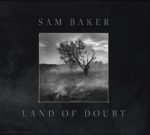 Straight up front, you need to know; this album won’t be for everyone. I have a strong suspicion that this is deep into Marmite territory, that it’s an acquired taste. Texan Sam Baker is one of those songwriters who is revered by his peers (Malcolm Holcombe’s another) who understand the journey he’s on and appreciate the craft involved in his work. One of his aims with “Land of Doubt” is to tell the stories or convey the feelings to his listeners in the most economic way possible without losing any of the nuances. Stripping back music usually involves leaving out instruments that add texture to arrangements, keys, horns, even electric guitar and bass. The approach Sam Baker has taken is to work out the minimum of sounds necessary to create the feeling he wants to evoke and to add nothing extraneous to it.
Straight up front, you need to know; this album won’t be for everyone. I have a strong suspicion that this is deep into Marmite territory, that it’s an acquired taste. Texan Sam Baker is one of those songwriters who is revered by his peers (Malcolm Holcombe’s another) who understand the journey he’s on and appreciate the craft involved in his work. One of his aims with “Land of Doubt” is to tell the stories or convey the feelings to his listeners in the most economic way possible without losing any of the nuances. Stripping back music usually involves leaving out instruments that add texture to arrangements, keys, horns, even electric guitar and bass. The approach Sam Baker has taken is to work out the minimum of sounds necessary to create the feeling he wants to evoke and to add nothing extraneous to it.
The economy isn’t just applied to the instrumentation. The melodies and the rhythms are kept sparse and simple and even the number of words is restricted, a bit like applying the haiku discipline to every aspect of making an album. Producer and drummer Neilson Hubbard, guitar player Will Kimbrough and cool jazz trumpeter Don Mitchell create perfect minimalist arrangements that allow the songs plenty of space; each of the elements is honed to perfection like a setting designed to emphasise a perfect gemstone, but not to overpower. There isn’t a hint of a standard format or template here. Each song gets exactly the instrumentation it needs; nothing more, nothing less. The percussion ranges from the almost non-existent on the country waltz “Love is Patient” to loud drums competing with the vocal on the swampy “Moses in the Reeds” and the military beat of “Some Kind of Blue”, telling the story of a Vietnam veteran who looks back to the war as the happiest time of his life.
At first glance, the track listing seems a little long, but ten songs are interspersed with five instrumental interludes that help to alleviate the sombre mood of the songs while additional colour and texture come in the form of Will Kimbrough’s ambient atmospherics, some piano and harmonium and some deft Chet Baker-style trumpet from Don Mitchell, particularly on “Say the Right Words”, the story of parents who disapprove of their daughter’s choice of partner but are too scared or smart (you decide) to tackle the matter head-on. One of Sam Baker’s strengths is in picking out these little tragedies from the background noise we’re surrounded and showing us the importance they have to the protagonists. It’s not always comfortable, but you can’t stop listening.
As I said at the top of this piece, it won’t be for everyone, but if you like the craft of the songwriter and the arranger, then you won’t be disappointed.
“Land of Doubt” is released on Friday June 16.
 Tricky’s debut album “Maxinquaye” came out in 1995 and is now, some eighteen years later, regarded as not only his best work, but also one of the most inspirational and best examples of the trip-hop genre which first appeared in the early nineties. The pressure for him to repeat the success and the sounds contained on “Maxinquaye” seem to have been so great that Tricky has actually stated that this, his tenth album, (I know, it shocked me too) is a return to the essence of his debut and also of him as an artist. This doesn’t sound like the successor to “Maxinquaye” in that an updated version would have to be terrifyingly experimental and claustrophobic, sticky and dark, but “False Idols” is soulful, mature even and the predominant feminine psyche (something which Tricky has always been very much in touch with in both his music and the images that have accompanied it) is represented and presented as vulnerable and maybe damaged but wilful and intact.
Tricky’s debut album “Maxinquaye” came out in 1995 and is now, some eighteen years later, regarded as not only his best work, but also one of the most inspirational and best examples of the trip-hop genre which first appeared in the early nineties. The pressure for him to repeat the success and the sounds contained on “Maxinquaye” seem to have been so great that Tricky has actually stated that this, his tenth album, (I know, it shocked me too) is a return to the essence of his debut and also of him as an artist. This doesn’t sound like the successor to “Maxinquaye” in that an updated version would have to be terrifyingly experimental and claustrophobic, sticky and dark, but “False Idols” is soulful, mature even and the predominant feminine psyche (something which Tricky has always been very much in touch with in both his music and the images that have accompanied it) is represented and presented as vulnerable and maybe damaged but wilful and intact.
This is a fifteen song album and only “Passion of the Christ” features Tricky on his own with no female support and probably sounds exactly as you might imagine it would. There are three female vocalists featured here and the one male guest is the lead singer of The Antlers singing a version of one their own songs. The women here sound and sing like Martina Topley-Bird, not featured here, who performed vocals on Tricky’s first four albums and is rightly considered his ultimate collaborator and muse. “Maxinquaye” was a sample heavy album and Tricky has demonstrated a continued greed for bizarre cover versions (the “Wonder Woman” theme, “Slow” by Kylie, “The Love Cats” and “Happy Talk” amongst others all appear on previous albums) which hasn’t diminished here but these are his most successful interpretations to date.
“Somebody’s Sins”, which is a cover of Patti Smith’s interpretation of Van Morrison’s “Gloria”, is beautifully economical; just Francesca Belmonte’s small but confrontational voice, a bassline and the sound of a muted bee buzzing in a jar and, at barely three minutes long, it’s an impressive opening track. “Valentine” sees Tricky duetting with Chet Baker’s “Funny Valentine”, “Hey Love” uses a two note, instantly recognisable sample from Japan’s “Ghosts” and “Does It” is actually a pretty loyal, albeit more minimal, cover version of the brilliantly threatening “Love Is A Chain Store” by The Ropes. Along with the swooping Massive Attack-lite of “Nothing’s Changed” and Nneka, criminally given only one track, recalling “Raw Like Sushi” Neneh Cherry on “Nothing Matters”, this collection actually sounds like one of the more polite trip-hop releases from the late nineties. Tricky may well have wanted to avoid this but it’s something that he can’t seem to escape and in this instance, it’s not a criticism. Lyrical themes of isolation, class, betrayal and sex remain and occasionally, such as on the low-slung, stop-start funk of “Is That Your Life” where Francesca Belmonte narrates a typical dealer’s day and Tricky mumbles ‘you does your bird, you keeps your word’, it can be clumsy and clichéd and somewhat retrograde.
“False Idols” is occasionally menacing but overwhelmingly intimate, quiet and quite lovely. Admittedly there is filler here and if it were a twelve-track album then a lot of its problems would be solved, but it’s also Tricky’s most cohesive collection in a decade; “False Idols” is maybe a more revealing title than initially assumed. Tricky has made the album he wanted to and has declared that he proudly stands by every song featured. He’s clearly a variation on the person he was almost two decades ago; not the same man but why would he be? To put him on a pedestal and expect him to recreate what’s now considered to be his masterpiece again is naive and misplaced. Tricky has moved on and this album proves that he has to ability and imagination to make material that is maybe minor, but is valid and engaging nonetheless.


